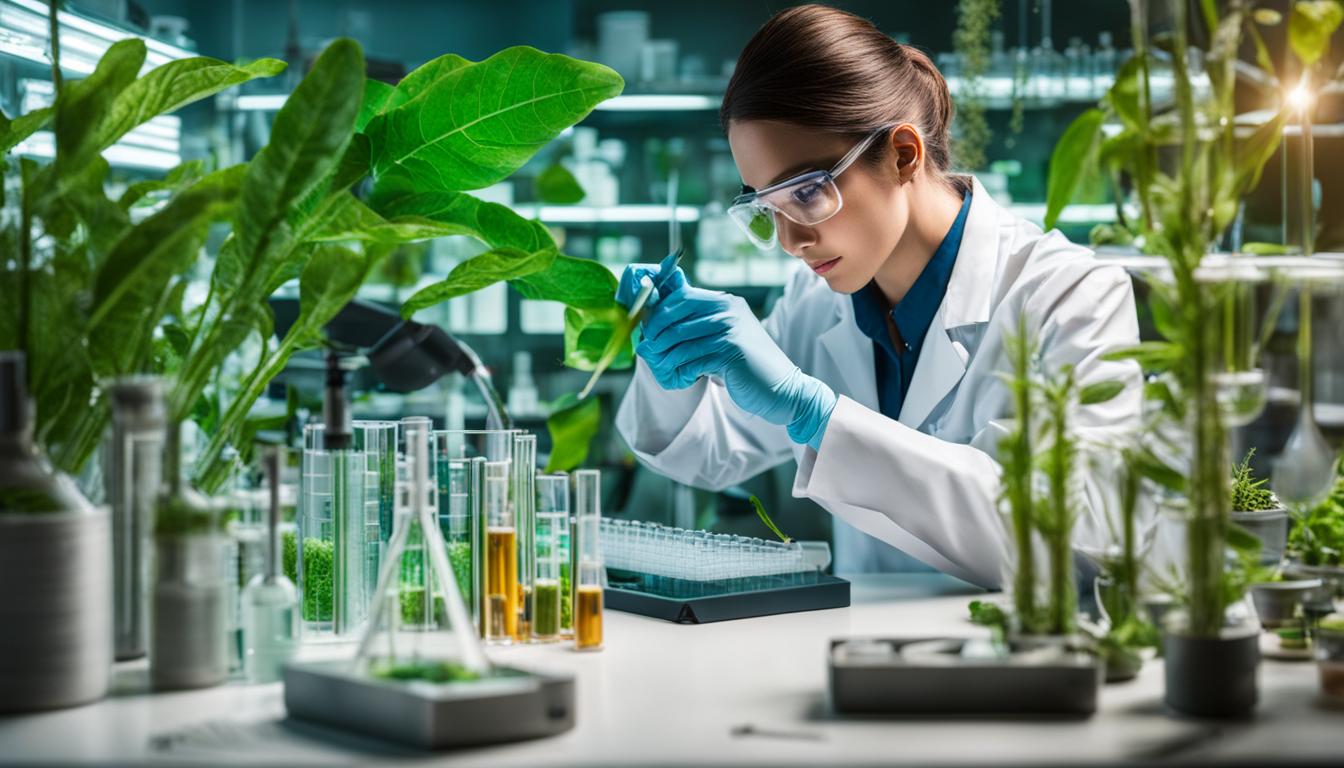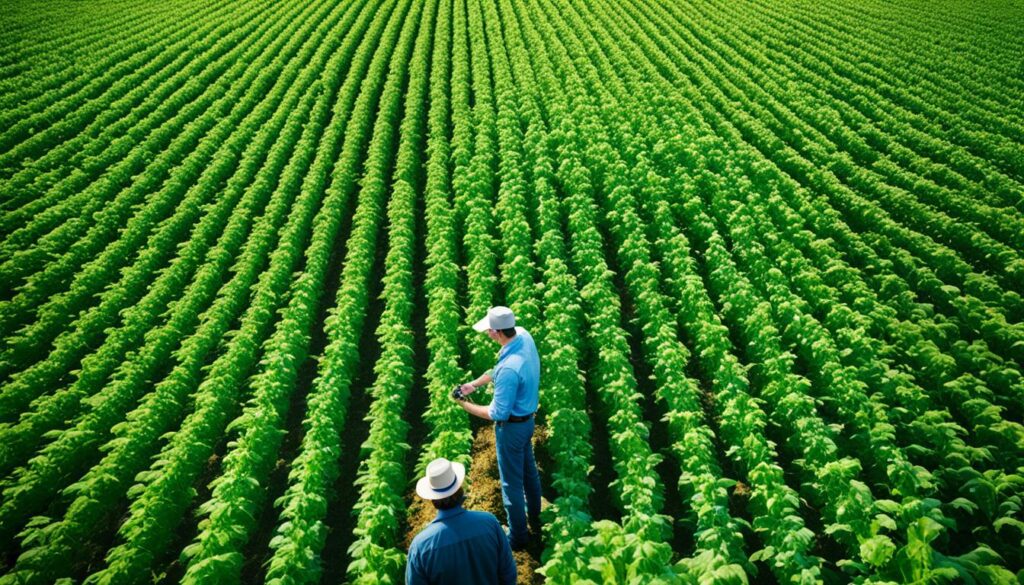
The field of agricultural biotechnology offers exciting career opportunities for individuals who are interested in combining DNA technology with agriculture. By utilizing scientific techniques such as genetic engineering, molecular diagnostics, and tissue culture, agricultural biotechnology professionals can modify animals, plants, and microorganisms to improve crop yield and enhance resistance to stress factors.
If you are passionate about working with the latest technology and making a positive impact in the field of agriculture, exploring career options in agricultural biotechnology could be the perfect fit for you.
Key Takeaways:
- Agricultural biotechnology combines DNA technology with agriculture to improve crop yield and resistance to stress factors.
- Genetic engineering, molecular diagnostics, and tissue culture techniques are applied in agricultural biotechnology.
- Career options in this field include bioinformatics scientist, field scientist, protein biochemist, research and development specialist, plant geneticist, and plant biologist.
- Agricultural biotechnology offers benefits such as reduced vulnerability to environmental stresses, improved yield, increased nutritional value, and a more sustainable approach to farming.
- The future of agricultural biotechnology holds immense potential for advancements in technology, precision breeding, and innovative crops.
What Is Agricultural Biotechnology?
Agricultural biotechnology, also known as agritech, is a branch of agricultural science that utilizes scientific techniques and tools to modify living organisms for the purpose of improving crop yield, resistance to stress factors, and overall agricultural product quality. This field encompasses various scientific methods such as genetic engineering, molecular diagnostics, and tissue culture, which play important roles in crop improvement and sustainable farming practices.
Genetic engineering is a key component of agricultural biotechnology, enabling the insertion or modification of genes in plants, animals, and microorganisms to achieve desired traits. Through genetic engineering, scientists and researchers can enhance the nutritional content, pest and disease resistance, and tolerance to environmental conditions in agricultural crops.
Molecular diagnostics is another technique employed in agricultural biotechnology, allowing for the analysis and cultivation of modified organisms. This method involves the use of advanced molecular tools to identify and assess specific genes or traits in living organisms.
Tissue culture techniques further contribute to agricultural biotechnology by providing a controlled environment for the growth and development of plant tissues and cells. This enables researchers to propagate specific plant varieties and create disease-free planting materials.
“Agricultural biotechnology represents the intersection of scientific innovation and sustainable agricultural practices.”
Agricultural biotechnology has revolutionized the way we approach crop improvement. By harnessing the power of genetic engineering, molecular diagnostics, and tissue culture, scientists and researchers are working towards developing crops that are more resilient, productive, and nutritious. This transformative field holds immense potential for addressing global food security challenges and driving sustainable agricultural practices.
Applications of Agricultural Biotechnology
| Applications | Description |
|---|---|
| Genetic Engineering | Modification of genes in organisms to enhance desired traits such as pest and disease resistance, tolerance to environmental conditions, and nutritional value. |
| Molecular Diagnostics | Analysis and assessment of genes or traits in living organisms using advanced molecular tools. |
| Tissue Culture | Cultivation and propagation of plant tissues and cells in a controlled environment to produce disease-free planting materials and specific plant varieties. |
Agricultural biotechnology is transforming the agricultural landscape by providing innovative solutions to enhance crop production, improve food quality, and minimize the environmental impacts of farming practices.
How is Agricultural Biotechnology Used?
Agricultural biotechnology plays a crucial role in revolutionizing modern farming practices, providing farmers with innovative tools to enhance efficiency, reduce costs, and improve crop production. By harnessing the power of genetic engineering, agricultural biotechnology offers solutions for various challenges faced by farmers, including weed control, herbicide tolerance, and the development of improved crop varieties. Here are some key applications of agricultural biotechnology:
Weed Control and Herbicide Tolerance
One of the significant advantages of agricultural biotechnology is the ability to genetically modify crops to tolerate specific herbicides. This enables farmers to employ targeted weed control strategies without harming the crops. By using herbicide-tolerant crops, farmers can effectively manage weed infestations and reduce the competition for resources such as water, nutrients, and sunlight, leading to improved crop production. Additionally, herbicide-tolerant crops minimize the reliance on manual labor for weed removal, saving time and labor costs for farmers.
Improved Crop Production
Agricultural biotechnology plays a vital role in enhancing overall crop productivity. Through genetic engineering techniques, scientists can introduce desirable traits into crops, such as improved disease resistance, increased yield potential, and enhanced nutritional content. By developing genetically modified crop varieties, agricultural biotechnology enables farmers to grow plants with built-in defenses against pests, diseases, and environmental stresses, resulting in higher crop yields and healthier produce.
Other Applications
Aside from weed control and improved crop production, agricultural biotechnology has a range of other applications that contribute to the advancement of farming practices. These include the development of vaccines for livestock, which helps prevent the spread of diseases and ensures animal health. Agricultural biotechnology also aids in improving the texture, taste, and nutritional value of food, providing consumers with high-quality, nutritious products. Furthermore, the use of genetically modified crops can reduce the need for synthetic pesticides and fertilizers, leading to more sustainable and environmentally friendly farming methods.

| Benefits | Description |
|---|---|
| Enhanced Weed Control | Genetically modified crops tolerate specific herbicides, allowing targeted weed control and reducing competition for resources. |
| Improved Disease Resistance | Genetic modifications can enhance crop’s resistance to diseases, minimizing yield losses and improving overall crop health. |
| Increased Nutritional Content | Genetically modified crops can be enriched with essential nutrients, addressing nutritional deficiencies and promoting better health. |
| Reduced Environmental Impact | By reducing the need for synthetic pesticides and fertilizers, agricultural biotechnology promotes more sustainable farming practices. |
These are just a few examples of how agricultural biotechnology is transforming the agricultural industry. By leveraging DNA technology and genetic engineering, farmers can benefit from more efficient and sustainable farming practices, ensuring improved crop production and a more secure food supply.
What Are the Benefits of Agricultural Biotechnology?
Agricultural biotechnology plays a crucial role in revolutionizing the field of agriculture, offering numerous benefits that contribute to sustainable and efficient farming practices.
One of the key advantages of agricultural biotechnology is the reduced vulnerability it provides to crops. Genetically modified organisms (GMOs) have been engineered to withstand environmental stresses such as drought, pests, and diseases. This increased resilience leads to improved crop yield and quality, providing farmers with greater productivity and profitability.
“Genetically modified crops are an invaluable tool for farmers, as they have the ability to thrive in challenging environmental conditions. By enhancing crop resilience, we can ensure a more stable and abundant food supply for future generations.” – Dr. Jane Alvarez, Agricultural Biotechnologist
Additionally, agricultural biotechnology offers the opportunity to enhance the nutritional value, texture, taste, and appearance of crops. Through genetic modifications, scientists can enrich crops with essential vitamins and minerals, improving the overall nutritional content of food. This has the potential to address nutritional deficiencies and improve public health on a global scale.
By utilizing agricultural biotechnology, farmers can also reduce their dependence on harmful pesticides, fertilizers, and other agrochemicals. This leads to a more sustainable and environmentally friendly approach to farming, minimizing the negative impact on ecosystems and human health.
Overall, agricultural biotechnology offers a promising way to address the challenges of modern agriculture. With reduced vulnerability, improved yield, and increased nutritional value, it has the potential to transform the way we produce food and ensure a more sustainable future.
Career Options in Agricultural Biotechnology
Looking to pursue a career in the exciting field of agricultural biotechnology? There are various paths you can take to make a meaningful impact in this growing industry. Here are some of the career options that await you:
Bioinformatics Scientist
As a bioinformatics scientist, you will combine your expertise in computer science, statistics, and biology to analyze large datasets of biological information. This vital role involves developing algorithms and software tools to interpret genetic data and uncover insights into agricultural applications.
Field Scientist
Field scientists play a crucial role in agricultural biotechnology by conducting research and experiments directly in the field. They study plant genetics, agricultural practices, and environmental factors to develop innovative solutions for crop improvement and sustainable farming practices.
Protein Biochemist
A protein biochemist focuses on studying the structure, function, and interactions of proteins within living organisms. This knowledge is essential for understanding how proteins can be modified or manipulated to enhance agricultural productivity, nutrient content, and disease resistance in crops.
Research and Development Specialist
As a research and development specialist, you will be at the forefront of innovation in agricultural biotechnology. You will design and implement experiments, analyze data, and collaborate with multidisciplinary teams to develop new technologies, products, and methods that advance crop genetic improvement and sustainable farming practices.
Plant Geneticist
Plant geneticists specialize in studying plant genomes and the inheritance of specific traits. They use this knowledge to create new crop varieties with improved characteristics such as increased yield, disease resistance, and adaptation to environmental conditions.
Plant Biologist
Plant biologists study the structure, function, and behavior of plants at the cellular, molecular, and organismal levels. They investigate plant genetics and physiology, conduct experiments, and contribute to the development of genetically modified crops with desirable traits and enhanced productivity.
These are just a few examples of the career options available in the dynamic and promising field of agricultural biotechnology. Whether you’re passionate about computational biology, field research, protein science, or genetic engineering, there’s a role for you to make a difference in shaping the future of agriculture.
| Career Option | Job Description |
|---|---|
| Bioinformatics Scientist | Combines expertise in computer science, statistics, and biology to analyze genetic data and develop algorithms for agricultural applications. |
| Field Scientist | Conducts research and experiments in the field to study crop genetics, agricultural practices, and environmental factors. |
| Protein Biochemist | Studies the structure and function of proteins to enhance agricultural productivity and disease resistance. |
| Research and Development Specialist | Leads innovation in agricultural biotechnology by designing experiments, analyzing data, and developing new technologies. |
| Plant Geneticist | Specializes in studying plant genomes and developing crop varieties with improved traits. |
| Plant Biologist | Studies the structure, function, and behavior of plants to contribute to the development of genetically modified crops. |
The Future of Agricultural Biotechnology
The future of agricultural biotechnology holds immense promise, driven by ongoing advances in technology. This field is constantly evolving and pushing the boundaries of innovation in DNA technology and its applications in agriculture. One of the key areas of development is precision breeding, where specific genes are targeted for modification to enhance desired traits in crops.
Precision breeding allows scientists to select and manipulate genes that contribute to improved yield, resistance to stress factors, and nutritional value in crops. By precisely modifying the genetic makeup of plants, agricultural biotechnology is revolutionizing crop production and addressing the challenges faced by farmers worldwide. This targeted approach enables the development of crops that are more resilient, efficient, and sustainable.
“Precision breeding is a game-changer in the field of agriculture. It offers an unprecedented level of control over crop traits, leading to enhanced productivity and quality.”
Furthermore, the future of agricultural biotechnology holds the potential for the development of entirely new types of crops through genetic engineering and other innovative techniques. Scientists are exploring ways to introduce beneficial traits in crops that were previously unattainable, such as improved resistance to diseases, pests, and environmental stressors.

Through advances in technology, agricultural biotechnology is at the forefront of creating innovative crops that address the needs of a rapidly changing world. These crops can be tailored to meet diverse demands, including climate resilience, reduced environmental impact, and improved nutritional content.
Advancements in Agricultural Biotechnology
| Technological Advancement | Impact on Agriculture |
|---|---|
| Gene Editing | Allows for precise alterations in the DNA of crops, resulting in improved traits and increased yield. |
| Nanotechnology | Enables the development of nanosensors for efficient monitoring of crop health and environmental factors. |
| Remote Sensing | Helps farmers optimize resource management by providing real-time data on soil moisture, crop health, and pest infestations. |
| Vertical Farming | Utilizes controlled environment agriculture to maximize crop production in limited space and reduce water and pesticide usage. |
These advancements in agricultural biotechnology are revolutionizing the way we grow and cultivate crops. By leveraging cutting-edge technologies, precision breeding, and innovative crops, the future of agriculture holds promise for sustainable and efficient farming practices.
How can a career combining DNA technology and forensics also be applied to agriculture?
The integration of DNA technology in forensics career can also have significant applications in agriculture. Through this combination of disciplines, DNA analysis techniques can be employed to identify and track specific genetic traits in plants and animals. This can aid in crop improvement, disease resistance, and selective breeding, ultimately enhancing agricultural productivity and sustainability.
Conclusion
Agricultural biotechnology offers a unique career path that combines the power of DNA technology with the world of agriculture. Professionals in this field have the opportunity to work with the latest scientific techniques and contribute to the advancement of sustainable farming practices. By harnessing the potential of genetic engineering, molecular diagnostics, and tissue culture, agricultural biotechnology has a significant impact on crop yield, resistance to stress factors, and the overall sustainability of the agricultural industry.
The combination of DNA technology and agriculture has revolutionized the way we approach food production. Genetically modified crops are engineered to withstand harsh environmental conditions and pests, thus ensuring improved crop productivity. By enhancing the nutritional value and texture of agricultural products, agricultural biotechnology helps in meeting the ever-growing demands of a global population.
As the field of agricultural biotechnology continues to evolve, it presents exciting opportunities for individuals who are passionate about making a positive difference in the world of agriculture. Through innovative applications of DNA technology, professionals in this field can pave the way for future advancements in precision breeding, the development of novel crops, and the implementation of sustainable farming practices. By leveraging the benefits of agricultural biotechnology, we can create a more resilient, efficient, and environmentally-friendly agricultural sector that can meet the challenges of tomorrow.








